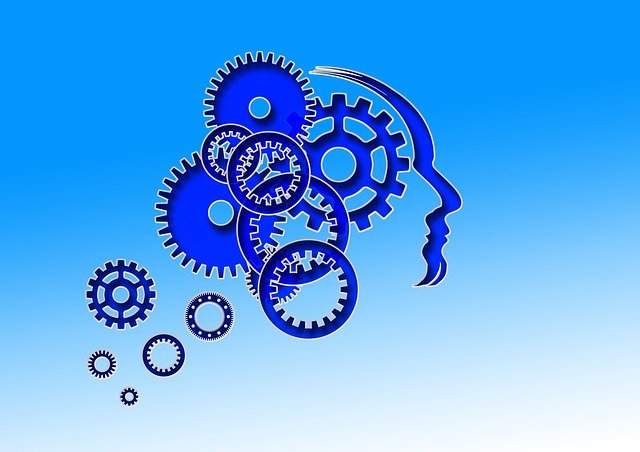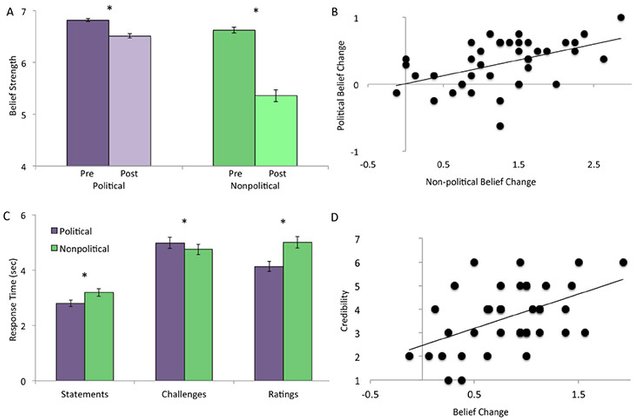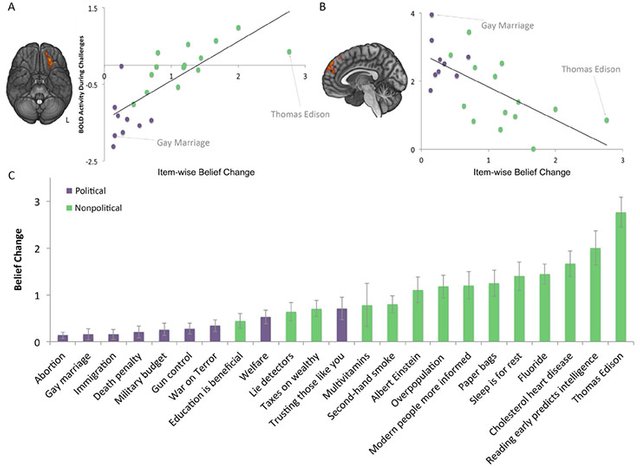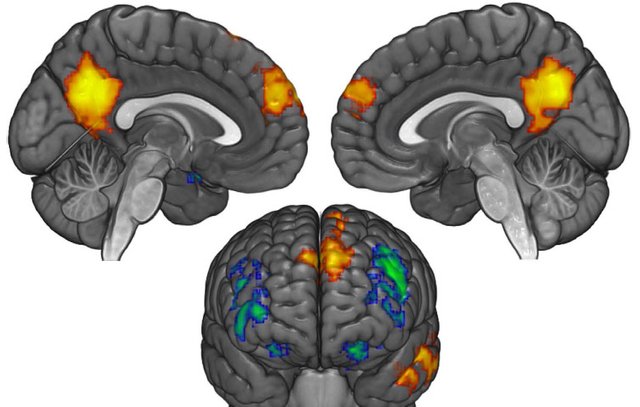Changing Our Minds is to Change Ourselves and Who We Are
Presenting evidence or facts doesn't always get accepted. Emotions can win over reason, and feeling-good can matter more than facts. We can dismiss evidence that contradicts our firmly held beliefs. There is even the backfire effect where we can dig into our belief and hold on tighter than before.

Source: pixabay
A study published in Scientific Reports in 2016, indicates that challenging political beliefs activates areas of the brain that govern personal identity and emotional responses to threats. It shows how much we are associating our identity with beliefs.
The study set out to look at how much people change their minds on political and nonpolitical issues when provided with counter evidence. This would help them determine which brain networks responded to firmly held beliefs. Contradictory arguments were presented to 40 liberals that held strong political and nonpolitical views. They were all examined with fMRI see how their brains responded to their beliefs being challenged.
Nonpolitical beliefs held the most flexibility when they gaged the strength of their beliefs in a statement. For example, "Albert Einstein was the greatest physicist of the 20th century". But reconsidering political beliefs is another issue entirely. Those who support the military, and the funding of the military, would not budge when asked to reduce funding for the military.

Licensed under a Creative Commons Attribution 4.0 International License
When their political beliefs were challenged, it produced an increase in activity of the default mode network, which are sets of interconnected structures that are associated with self-representation (identity) and disengagement from the external world to focus on ourselves. A narrowing of our mental vision takes place.
The amygdala is also involved with perceiving threats and anxiety. The emotional salience of stimuli engages our attention bias and availability heuristic so we focus on it the most and feel threatened, anxious or emotional, which makes us less likely to change our minds.
Each participant chose 8 political and 8 nonpolitical statements that they said they believed in, and were shown 5 counterclaims to challenge each statement they accepted. Then the participants rated the strength of the belief in the original statements on a scale of 1 to 7. Counterclaims to political beliefs tended to not change minds, while counterclaims to nonpolitical beliefs were more easily influenced to create doubt and reduce the confidence and strength in the statement they previously believed.

Licensed under a Creative Commons Attribution 4.0 International License
One thing to note is that all the participants were strong liberals, so it's not clear how the results would turn out if it was applied to conservatives or people with less polarized political beliefs. Previous studies have found structural or functional differences between the brains of conservatives and liberals. Despite being a liberal, when someone's belief is under attack they take that threat personally and proceed to conserve the belief. Conservatives have that tendency for increased threat avoidance. In this way everyone tends to act as a "conservative".
These findings shed light on the resistance to change that emotion plays in our attachment to belief.
When our deeply held beliefs are challenged, rather than pay attention to the external world and take in stimulus and process it properly in cognition, we often engage in stimulus-independent internally-directed cognition which creates a feedback-loop that is detached from the objective reality around us.
Emotions come into play in the persistence of our beliefs which clouds our ability to see things properly. The brain's systems for emotions is engaged when protecting our psychological and identity frameworks that are strongly attached to beliefs.
The neural systems involved in upholding beliefs and motivated reasoning are also better understood. The findings suggest that the Default Mode Network is important for higher-level thinking about the personal beliefs and values we hold dear, whether they are true or false.

Licensed under a Creative Commons Attribution 4.0 International License
The new study doesn't mention the backfire effect but they are essentially explaining this as well. People become more hardheaded and ingrained into their political beliefs when contradictory evidence forces them to take a defensive position. So it's like you are bunkering down, digging into the trenches for a battle of something attacking your identity through the belief that you're attached to and don't want to let go of.
I have talked about identity and attachment in many posts before, how our sense of self and worldview can be based on false information and we become attached to that falsity as part of our ego-personality-identity constructs. To attempt to dismantle and destroy a falsity is felt as an attack on a person themselves when they have become attached to that falsity as part of their sense of self and identity. This results in emotionally defensive behavior in order to maintain their false identity.
Lead author Jonas Kaplan explains how difficult it is for us to reevaluate new information once we become attached to it as part of ourselves:
"Political beliefs are like religious beliefs in the respect that both are part of who you are and important for the social circle to which you belong. To consider an alternative view, you would have to consider an alternative version of yourself."
That's partially why attachment is the root of all suffering. We get attached to falsity and then truth comes along and we don't want to accept the truth because were to attached to what's false. This prevents us from moving forward in alignment with truth and reality.
These findings are helping researchers understand when and why people are likely to change their minds. One thing that troubles me is they are looking at this in order to determine and know how and through which statements someone may be persuaded to change their political beliefs. They view this as a key for societies progress, i.e. what to tell people to get them to change their minds politically.
We are the age of the scientific dictatorship in many ways. These social science models can be used for social engineering and manipulation of consciousness towards political agendas. I always appreciate more discovery in knowledge of ourselves, but it's a bit alarming when the scientists seem to lack a certain level of integrity and fidelity to truth instead of appeasing a political ideology. At least that's how their message comes off to me.
And of course they mentioned the importance of this capability to tackle the fake news problem. Manipulating people to change their minds about counter-establishment narratives that don't align with certain political motivations.
As much of my work mentions, emotion is an important part of our internal feedback process to evaluate and apply salience to things in order to motivate us to act. But letting emotion override an honest evaluation process is not beneficial.
References:
- Hard-wired: The brain's circuitry for political belief
- A new brain study sheds light on why it can be so hard to change someone's political beliefs
- Jonas T. Kaplan, Sarah I. Gimbel & Sam Harris. Neural correlates of maintaining one’s political beliefs in the face of counterevidence. Scientific Reports, December 2016 DOI: 10.1038/srep39589
Thank you for your time and attention. Peace.
If you appreciate and value the content, please consider: Upvoting, Sharing or Reblogging below.
 me for more content to come!
me for more content to come!
My goal is to share knowledge, truth and moral understanding in order to help change the world for the better. If you appreciate and value what I do, please consider supporting me as a Steem Witness by voting for me at the bottom of the Witness page.

While I agree with most of what you say and find it interesting, I think you are pessimistic about this paragraph.
Everybody, regardless of good or bad intentions needs to know this. You believe it to be about social engineering and manipulation. But the idea would be to get people of all beliefs to look at rationally what is right before them.
The problem is, you state this can be used for social engineering or manipulation, but it can also be used for making people wake up. Realizing that their beliefs are not reality, they are thoughts and opinions that can affect the real world and those around them
It goes back to the cave analogy that Plato and Socrates came up with years ago. The idea that people who are stuck in a cave and the cave is all they know, they will only accept what's in the cave, not the world outside the cave.
This has been an issue for thousands of years, and I think it's something 100% worth looking into. The ignorance of people will be our downfall if we continue to allow those that will use that ignorance to further entrench ignorant and false beliefs into the populace.
How is this to be fixed? What can we do that no people have done for thousands of years.
The internet could help, but it's currently making it worse.
Whats the answer??? I think the answer has to be these studies, these scientific philosophers asking the questions of how to get people to wake up and see reality, instead of hiding in their cave and believing they are safe from the storm brewing outside.
You're right, I didn't phrase it fairly. Thanks for pointing that out. Knowing how to get ppl to let go and change their minds to see how something is false, not necessarily to shift to another political ideology that would be false as well. I just viewed it in terms of the false dichotomy of the polarized political spectrum, I guess. They are looking at it in terms of the "fake news" agenda, so that's why I had a negative outlook for their intent.
In group bias and digging in to defend held "truths" is so evident now that the media, education and political spheres have stirred their constituents as hard as they can against any outside their approved mindset. Without brain imaging I can attest that this dynamic is also at work among conservatives, especially Donald Trump supporters. While leaning conservatively, I do not identify with the right and have found myself in some heated exchanges with diehard Trump supporters when discussing things he has said in conjunction with the actions he has or has not taken on them.
When we choose to believe something, we are making an energetic agreement that we bind to ourselves. In essence, these "truths" begin to own us in the same way our possessions do, perhaps more so as we carry these agreements with us everywhere we go.
Due to decades of stalking my own thoughts, I am perhaps aware of it within myself more than many. Your posts are often a great place for me to do so, as we align in many of our beliefs. Because of this, when we arrived at the same conclusion using different roads, or there is a variation you will write about, it is interesting to watch my thoughts try to justify why you are mistaken, or if only you knew this or that you would understand the real "truth" of the matter. Sometimes I think it is easier to do this battle against ones energy investment into belief when it takes place with those we hold respect for. It makes it easier to temper our emotions when they first begin to whisper their irrational arguments.
Yes, the false dichotomy of politics is such. I'm more right leaning, but not politically aligned either ;) Left and right have valid things and invalid.
I can be mistaken. I don't know everything. i can only explain it with what I know. Usually I try to speak about what I can understand, which may have mistaken bits.
The world is literally retarded. And we wrestle not against flesh and blood, but against principalities, against powers, against the rulers of the darkness of this world, against spiritual wickedness in high places. The very spirit of falsity, deception, ignorance infests the human creature with ego madness and reptillian fear. All this brain function does not override the will to discover truth, if truth is duly valued. Truth is generally not valued in the primary place. That’s all it comes down to in the end - screwed up priorities, born of fear, born of lies. Religion, in the broadest context.
Yup, truth is fundamental at the core of our being, what we yearn for at a higher purposed level, but most operate at lower levels that they ignore the fire and desire for truth to liberate and rise them to great heights.
Personally, I believe in a universal and indivisible truth, but a truth that is either very difficult or impossible that we know, therefore, and based on that, it is likely that the person who is tied to an idea, and does not decide to change under any circumstance, he only becomes a slave to a lie.
It is interesting to see how we cling to some ideas, and also our behavior when someone presents arguments against us. Generally I am willing to change my point of view, although first I like to submit to an arduous analysis the new arguments, before accepting them.
Yes, we must be willing to admit wrong, and able to change. That doesn't mean everything that suggests we are wrong is. We always need to honestly evaluate and judge the information for accuracy.
I think this exists in many aspects of our lives, not just with political beliefs. I try to have an open mind with nearly everything because I was very close minded previously and have since expanded my consciousness.
I think one of the best examples of this is the flat earth versus globe earth argument. Both sides swear that they are correct. The mainstream obviously is in the bag for globe earth. The problem is people can’t think objectively. Neil degrasse is obnoxious in his vehement denial of the flat theory. Instead of putting people down with good explanation and data he just says that it’s ridiculous. I don’t know which to believe; both theories have merit. There is great evidence of the planet being flat or it could be unbelievably larger (and round) than we could even imagine. Seeing the mountain in France I think it is from a large number of miles away (I don’t specifically remember if it’s over a hundred or not, but according to the math for curvature it should never be visible at the distance yet it is) is one example that gives good credence to it being flatter than the calculations allow. I am not saying we live on a disc but do I think we live on a marble the size they say? No I don’t. People cling to the belief vociferously because it’s familiar to them and we can’t grow as a society or civilization if we cannot think open minded or objectively about things be they political, spiritual or scientific.
Just my opinion of course!
So no other planet is a disk, but the earth alone is, and that works out how? the arguments in favor of a flat earth aren't supported by any real evidence of an actual flat earth, merely hyper-skepticism based on a counter-mainstream polarized view. Whereas a globe does have evidence in the form of corroborated cartography and even technological evidence from higher elevations on the planet like the space station. I am open minded, but not to psy-ops.
I said that I don’t think it’s a disc but is it a globe with the dimensions they tell us? I don’t think it is.
Cartography doesn’t account for spots in the South Pacific that are not on any map. There’s swaths of regions that don’t register.
Watch some YouTube videos made by Jeranism. I don’t agree with everything he says, people call him a shill but I think he makes compelling points and arguments.
I am simply saying keeping an open mind is imperative. Rejecting information outright is bias; bias is as bad as cognitive dissonance. i Don’t believe this is a psy-op, it’s just challenging preconceived notions about where we live. I can’t begin to imagine what the place we live actually looks like.
Curated for #informationwar (by @commonlaw)
Our purpose is to encourage posts discussing Information War, Propaganda, Disinformation and other false narratives. We currently have over 7,500 Steem Power and 20+ people following the curation trail to support our mission.
Join our discord and chat with 150+ fellow Informationwar Activists.
Connect with fellow Informationwar writers in our Roll Call! InformationWar - Contributing Writers/Supporters: Roll Call Pt 8
Ways you can help the @informationwar
Rightly said. It's only when you keep aside your own perception that you are able to achieve true understanding.
Yes, its true and you are right
Can I get a Wake Up???
Posted using Partiko Android
top notch
resteem